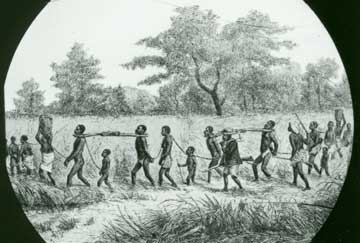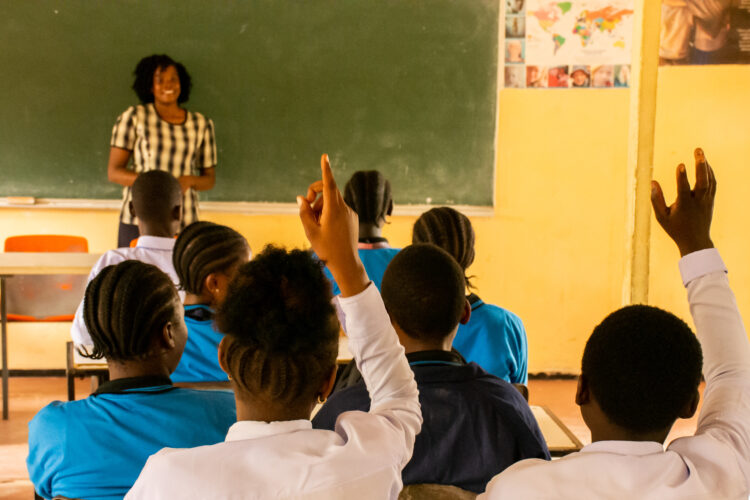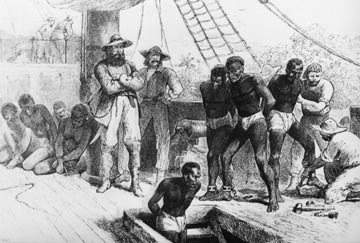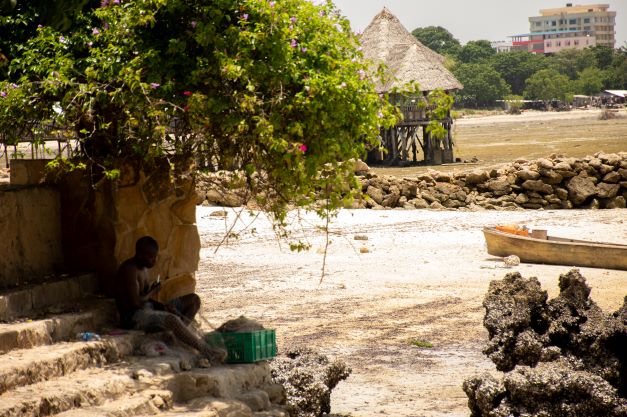Slavery resources

Speak out about modern slavery
We have a host of resources available for individuals, schools and faith groups
Download our free resources to help raise awareness of modern slavery in your communities
Anti-Slavery International's submission to the European Commission consultation for an initiative on sustainable corporate governance (mHREDD)
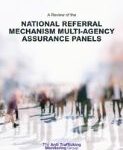
National Referral Mechanism multi-agency assurance panels: a review
This briefing reviews the provisions of the recently established Multi-Agency Assurance Panels (MAAPs) to date, assessing the extent to which they contribute to robust and transparent decision-making in the NRM. It focuses on the practical function of the MAAPs based on a survey conducted by ATMG in 2019, and feedback from 8 panellists. It goes on to highlight how this new approach to decision-making has revealed poor information sharing practices between relevant bodies, therefore undermining panel members’ ability to quality assure second stage negative decisions. In addition, it asks questions about victim support provisions more widely, especially for those engaging with the criminal justice system.
Written submission by members and endorsers of the Coalition to End Forced Labour in the Uyghur Region to the BEIS Committee consultation on Forced labour in UK value chains
This submission has been submitted on behalf of the 31 members and endorsers of the Coalition to End Forced Labour in the Uyghur Region, a coalition of over 280 Uyghur representative groups, civil society organisations, trade unions, faith-based groups and investors united to end state-sponsored forced labour and other egregious human rights abuses against people from the Uyghur Region in China, known to local people as East Turkistan.
Submission to BEIS Committee consultation on Forced labour in UK value chains:
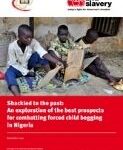
Shackled to the past: An exploration of the best prospects for combatting forced child begging in Nigeria
Anti-Slavery International, Research Centre for Human Rights and Civic Education (CHRICED)
Nigeria has more children growing up without a formal education than any other country. Largely unregulated and poorly positioned to serve as a safety net for underfunded and overstretched public education services, the Almajiri system has, since the 1980s, moved away from its roots as a traditional form of structured religious guidance to one based on exploitation, in which students are expected to sustain the schools and their own subsistence through begging and child labour. Limited effort made to improve the conditions at Qur’anic schools and this report outlines why previous interventions have failed, and what must happen to achieve progress in the future.
Joint civil society response to the UK Government’s response to the Transparency in Supply Chains consultation
Our statement with 9 partner organisations responds to the Government’s response to the Transparency in Supply Chains consultation, published in September 2020. We argue that a lack of commitment to meaningful sanctions and enforcement measures is a major concern – and that much tougher government action is needed to tackle modern slavery and other human rights abuses in corporate supply chains.
Joint submission for the Universal Periodic Review of Niger, 38th session
A joint submission by Anti-Slavery International, ANTD (Association Nigérienne pour le traitement de la délinquance et la prévention du crime), and Timidria, for the Universal Periodic Review of Niger, 38th session. It provides information and recommendations on descent-based slavery; the impact of Covid-19 on slavery; discrimination against people of slave descent; access to education for children of slave descent; the worst forms of child labour in Niger including forced child begging of talibés (children who study at residential Quranic schools), children in descent-based slavery, and of child domestic workers; and the wahaya (so-called 5th wife) practice.
Submission on forced child begging and descent based slavery Oct 2020:
Principal elements for an EU mandatory human rights and environmental due diligence law
As part of its sustained efforts to advocate for an EU legislation on mandatory Human Rights Due Diligence and as the legislative debate opens among EU institutions, Anti-Slavery International along with Action Aid, Amnesty International, CIDSE, Clean Clothes Campaign, ECCHR, ECCJ, FIDH, Friends of the Earth Europe, Global Witness and Oxfam have laid out a vision for the principal elements of such an EU legislation.
Due diligence has emerged as one of the primary tools for business enterprises, including financial institutions, to live up to their responsibilities towards people and planet.
It is understood as the process of identifying and assessing; ceasing, mitigating and preventing; tracking and monitoring; communicating and accounting for environmental and human rights risks and impacts. It is based on international standards that have been developed in collaboration with business enterprises, governments and civil society and across multiple sectors, and endorsed by the EU.
As the negotiations open, Anti-Slavery International stands open to dialogue with all stakeholders and will in particular invite its partners based in the Global South to provide their vision of what is needed to make change happen on the ground. The voices of people affected by forced and child labour and people vulnerable to labour exploitation must be central to the design and implementation of the legislation.
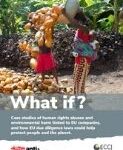
What if? Case studies of human rights abuses and environmental harm linked to EU companies, and how EU due diligence laws could help protect people and the planet
Anti-Slavery International and ECCJ
ECCJ’s and Anti-Slavery International’s report details a number of case studies where EU-based companies have failed to address corporate abuse and environmental harm in their global value chains, profited from it, and so far managed to avoid liability before the courts.
The case studies clearly demonstrate how EU wide mandatory cross-sectoral human rights and environmental due diligence legislation, with improved access to remedy rules, would make a difference in these cases. Only by introducing binding legislation can we truly protect people and the planet, tackle human rights and environmental abuses linked to European operations, products and services, and finally hold out-of-control EU-based companies to account.
Now is the time to make it happen.
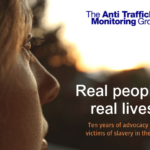
Real lives, real people: ten years of advocacy for victims of slavery in the UK
ATMG, Anti-Slavery International.
This report aims to tell the story of how and why the Anti-Trafficking Monitoring Group (the ATMG) was formed in 2009, and the impact it has had over the last decade. It also aims to illustrate the coalition as a model for good practice in holding governments around the world to account through ‘critical friendship’. Over a decade, the ATMG’s approach has sought to question the UK Government’s efforts to combat slavery and trafficking, while at the same time offering a positive critique of their actions in order to improve the protection of victims of slavery and their rights.
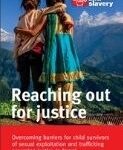
Reaching out for justice: Overcoming barriers for child survivors of sexual exploitation and trafficking accessing justice in Nepal
Anti-Slavery International, Children-Women in Social Service and Human Rights (CWISH) and Samrakshak Samuha Nepal (SASANE)
Nepal has long experienced high levels of child sexual exploitation and child trafficking for sexual purposes. Poverty, lack of education, peer pressure and the necessity of finding employment, have all compounded structural barriers and social prejudices built into patriarchal systems to increase the vulnerability of children, particularly girls, to sexual exploitation. This report outlines the findings of a qualitative study on the access to justice experiences of survivors of child sexual exploitation and trafficking in Nepal.
